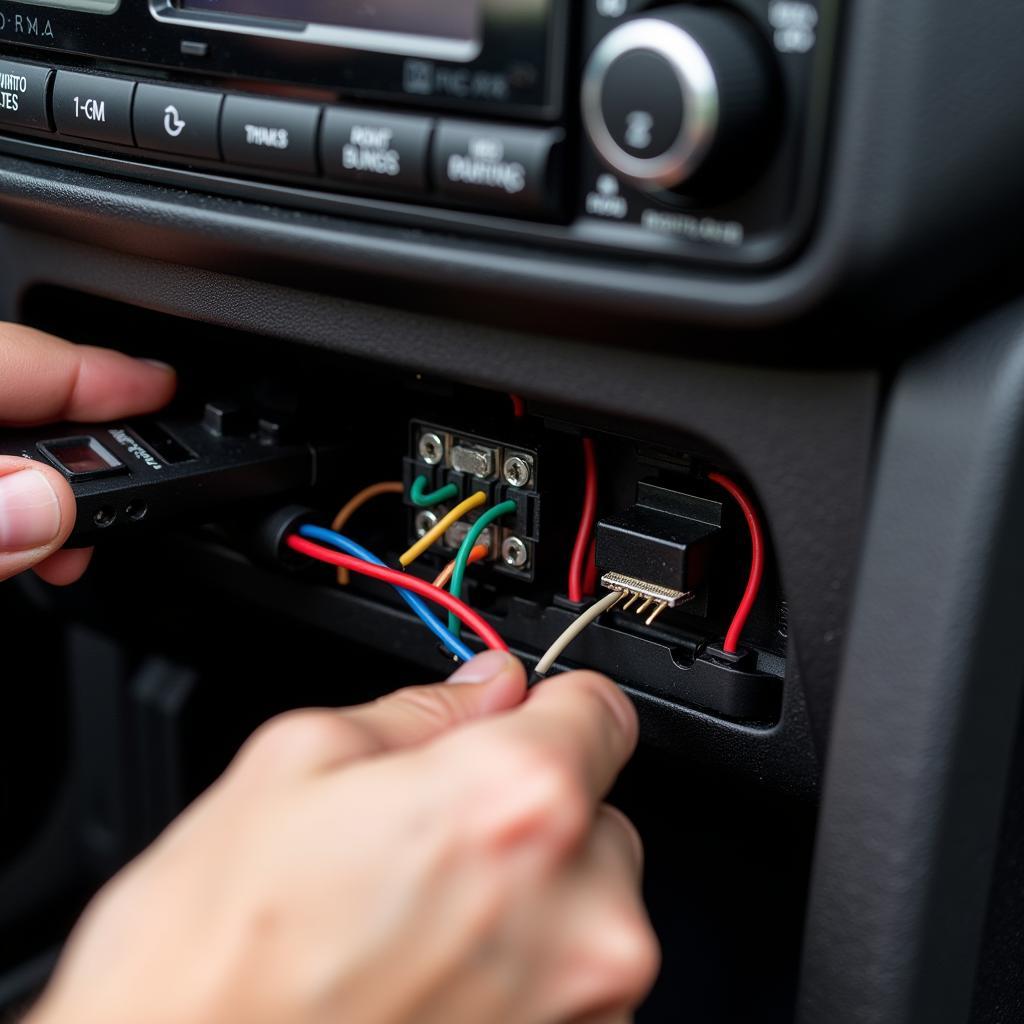Troubleshooting and fixing your car’s sound system can be a surprisingly straightforward process. Whether you’re dealing with a complete system failure or just a pesky buzzing sound, this guide will walk you through common car audio problems and how to solve them, from simple checks to more advanced fixes. Let’s get your tunes back on track! Check out our car audio fix page for more in-depth guides.
Diagnosing Common Car Audio Issues
Before diving into solutions, it’s important to identify the root cause of your car audio woes. A systematic approach will save you time and frustration.
No Sound at All
- Check the obvious: Is the system powered on? Is the volume turned up? Sometimes the simplest solutions are the easiest to overlook. Try adjusting the balance and fader controls as well, to ensure sound isn’t just directed away from your speakers.
- Inspect the fuses: A blown fuse is a common culprit for a completely silent system. Locate your car’s fuse box (usually under the dashboard or in the engine compartment) and check the fuse related to the audio system. Consult your owner’s manual for the specific fuse location. Replace any blown fuses with a new one of the same amperage.
- Examine the wiring: Loose or damaged wiring can interrupt the signal flow. Carefully inspect the wiring connections at the back of the head unit and at the speakers. Look for any frayed wires, loose connections, or signs of corrosion.
 Checking Car Audio Wiring for No Sound Issue
Checking Car Audio Wiring for No Sound Issue
Distorted Sound
- Check speaker connections: Distorted sound can be caused by loose or damaged speaker connections. Ensure the wires are securely attached to the speaker terminals.
- Inspect the speakers themselves: A blown speaker can produce distorted or muffled sound. Gently press on the speaker cone. If it feels gritty or makes a scraping noise, the speaker may be damaged.
- Check the head unit settings: Incorrect equalizer settings or other audio processing features can cause distortion. Try resetting the head unit to its factory settings.
Buzzing or Whining Sounds
- Grounding issues: A poor ground connection can introduce buzzing or whining sounds, especially those that change with engine speed. Check the ground wire for the head unit and amplifier (if equipped). Ensure it’s securely attached to a clean, metal surface on the car’s chassis.
- Interference from other electrical components: Other electrical devices in your car, such as the alternator or ignition system, can interfere with the audio signal. This interference often manifests as a whining sound that changes with engine speed. A noise filter can often resolve this issue. For more detailed information, visit our audio fix cars near me page to find a specialist in your area.
Intermittent Sound
- Loose connections: Intermittent sound is often caused by loose connections somewhere in the system. Check all wiring connections, including those at the head unit, amplifier, speakers, and antenna.
- Faulty head unit: If other components have been ruled out, the head unit itself may be the problem. A failing head unit can cause a variety of issues, including intermittent sound, erratic display behavior, and other malfunctions.
Advanced Troubleshooting
If the basic checks haven’t resolved your issue, you may need to delve deeper into the system.
Using a Multimeter
A multimeter can be a valuable tool for diagnosing car audio problems. It allows you to test the continuity of wires, check voltage levels, and identify shorts or opens in the circuits.
Checking the Amplifier
If your car has an external amplifier, it could be the source of the problem. Check the amplifier’s power and ground connections, as well as the input and output signals.
“A common mistake is assuming the head unit is the problem when it’s actually the amplifier,” says John Smith, a certified automotive electrician with over 20 years of experience. “Always test each component individually to pinpoint the culprit.”
Preventing Future Problems
Regular maintenance can help prevent future car audio problems. Keep the system clean and free of dust and debris. Inspect the wiring periodically for any signs of wear or damage. And always consult your owner’s manual for specific instructions and recommendations.
Conclusion
Fixing your car sound system doesn’t have to be a daunting task. By following the steps outlined in this guide, you can diagnose and resolve many common audio problems yourself. Remember, a systematic approach is key. Start with the simplest checks and work your way through the more advanced troubleshooting steps. If you’re still stuck, feel free to contact us at AutoTipPro for expert assistance. Our number is +1 (641) 206-8880 and our office is located at 500 N St Mary’s St, San Antonio, TX 78205, United States. We’re always happy to help get your car sound system back in top shape. You can also find help with other car problems, like how to fix airconditioner line on a car. Or if you’re looking for a car radio fix specifically in Auckland, we’ve got you covered with our guide on car radio fix auckland. Even for RC car enthusiasts, we have guides like fixing a new bright rc car. Now get back to enjoying your favorite tunes!




Leave a Reply